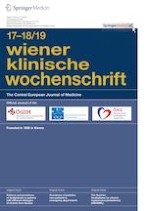22.08.2019 | original article
Serum nectin-2 and nectin-4 are diagnostic in lung cancer: which is superior?
Erschienen in: Wiener klinische Wochenschrift | Ausgabe 17-18/2019
Einloggen, um Zugang zu erhaltenSummary
Nectins are immunoglobulin-like molecules that are involved in cell to cell adhesion by forming tight junctions and homophilic/heterophilic interactions. This study aimed to analyze serum nectin‑2 and nectin‑4 levels in lung cancer patients and to evaluate the prognostic, diagnostic and predictive strengths. Data from 74 lung cancer patients were retrospectively examined and enzyme-linked immunosorbent assays (ELISA) were used to measure serum nectin‑2 and nectin‑4 concentrations. A total number of 40 age and sex-adjusted healthy controls were also enrolled in the study. The median serum nectin‑2 and nectin‑4 levels of the patients were significantly higher than those of controls (p < 0.001); however, neither biomarker was found to be associated with clinicopathological parameters, (p > 0.05), and furthermore they were found not to be correlated with either overall survival or progression-free survival (p > 0.05). Even though both markers showed high diagnostic values, serum nectin‑2 was found superior to both serum nectin‑4 and serum nectin-2 + nectin‑4 combinations in the diagnosis of lung cancer according to higher sensitivity, specificity and predictive values. Serum nectin‑2 and nectin‑4 might be used in lung cancer diagnosis but the diagnostic importance of nectin‑2 is higher. The prognostic and predictive strengths in cancer are controversial. Furthermore, the interactions with tumor microenvironments and the potentials as therapeutic targets for malignancies have yet to be elucidated.
Anzeige
